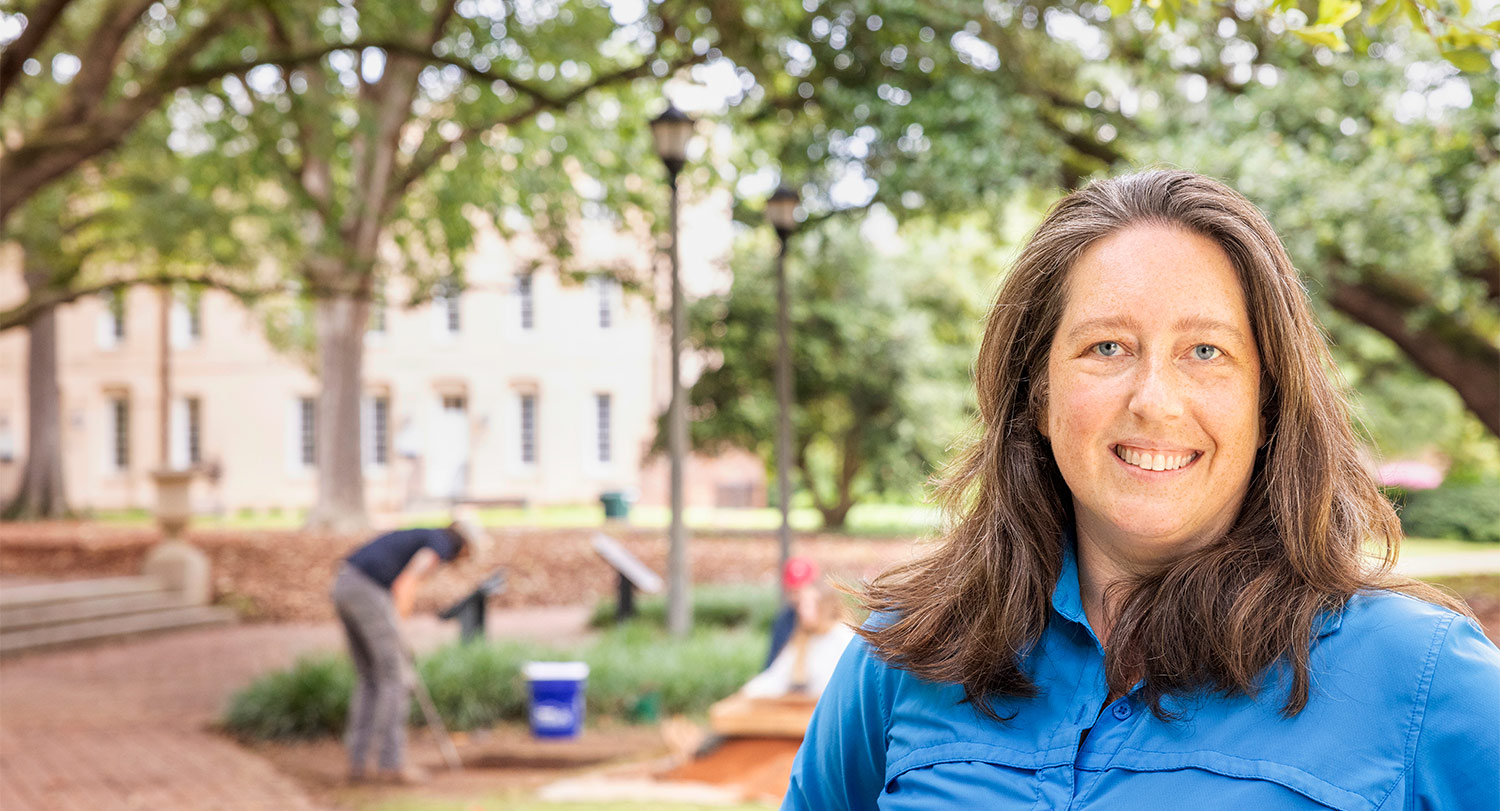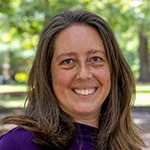
Kelly Goldberg, the winner of the university’s Michael J. Mungo Undergraduate Teaching Award, knows how a single experience in a classroom can change the course of a student’s career. It happened to her.
Goldberg, a clinical assistant professor of anthropology teaching in the South Carolina Honors College, started college as a history major. In a class on the history of Northern Ireland, the professor called on male students to read aloud from the textbook. One day, when a student asked if she could have an opportunity to read, the professor told her he found the female voice to be “particularly grating.”
Around the same time, her advisor suggested an introductory archaeology course.
“I was a nerd,” she says. “I came to every class, took all the notes. Because of my engagement, that professor asked me if I wanted to join her on a spring break archaeology excavation that she was conducting.”
The decision — an easy one — changed her life
“On one hand, I can have a man read a textbook to me. On the other hand, I could be out there finding history myself and engaging it,” Goldberg says. “Getting to touch things, getting to feel things, getting to learn about the process by actively doing it on the ground was something that was just so meaningful to me.
“I hope I can have a similar positive impact on students.”
That hope has been realized in her classroom — and in the field — every semester at USC. In one of her classes this past spring, students conducted archaeology excavations on the historic Horseshoe. She calls it her “full circle moment.”
“I've been teaching summer archaeology field schools, which I love teaching,” she says. “But to be able to teach a course during a regular semester where students actually conducted excavations of spaces they walk over every day — that was kind of a surreal moment that brought me back to thinking about how I got into the field in the first place.”
And, judging from the reflections of the students in her Horseshoe excavation class, the students had similar reactions.

“Especially in particularly challenging topics that students struggle with, being able to help in that process was the exciting thing for me."
“A lot of them said, ‘I've walked across this space for four years. Every day my feet have physically touched this grass. And yet I never thought about the fact that underneath the surface there are all these historical components.’”
It’s the kind of class she loves leading — courses where she sees the learning process happen in real time, helping students understand the importance of the connections of topics beyond their field of study.
Along with the field courses, Goldberg teaches classes including the introduction to biological anthropology, where the class talks about topics such as human evolution, and she makes a point to connect the class to other courses and contemporary issues.
“I get most excited when I teach these courses that have students with all different majors. And by the end of the semester, they're all saying, ‘I really had no idea how prevalent these biological anthropology concepts are in other areas of life.’ I just really enjoy seeing students make those connections across fields.”
Goldberg said she fell in love with teaching while she was a teaching assistant in graduate school at the University of South Carolina.
“Especially in particularly challenging topics that students struggle with, being able to help in that process was the exciting thing for me,” she says.
Goldberg grew up in New England and attended college in New York. She spent a few summers doing archaeology of a Viking settlement in Iceland — where she appreciated the beauty but learned she hated being cold, even in mid-June. She then did a cultural exchange trip to Togo in West Africa.
“That's when I kind of fell in love with West Africa,” she says.
Her graduate studies at Carolina took her to Guinea in West Africa where she worked on her dissertation and eventually earned a Fulbright grant to study there. She spent about 15 months on excavations in West Africa.
She earned her master’s and doctorate from USC’s College of Arts and Sciences. When she was hired as a clinical assistant professor in 2019, it had been a while since the university offered a field school, something undergraduate students need to experience if they plan to attend graduate school in archaeology. The director of the South Carolina Institute for Archeology and Anthropology asked if she was interested in teaching one.
Over the past few summers, she has taught an archeology field school at Sesquicentennial State Park. Students go to the site for six weeks to conduct excavations on the Richland County park that was established by the Civilian Conservation Corps in the late 1930s. Before that, there had been a plantation on the land, followed by a community of tenant farmers.
“I describe myself as a transatlantic African diaspora archaeologist. So it was really significant the kind of trajectory that I took to first do that work in West Africa and now look at these African diaspora sites in the Southeast U.S., thinking about that transmission of knowledge of peoples, of culture, and what that means. And that's something I'm able to then bring back into teaching and talk to students about."